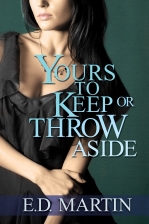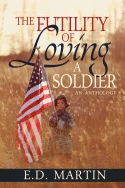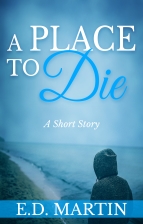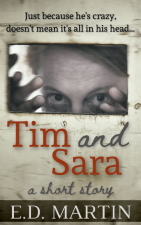In the forum you raised a question of how much description is necessary. In order to answer I came here to see how much description you are actually giving. What I found is the reason for this critique.
Before I begin I have to say that your writing with more skill than the vast majority of people here—something I don’t say lightly. Unfortunately, there are some problems related to description, that need to be addressed—though not as you might expect. Simply put, everything you say is a description. Look at your first paragraph. It’s a series of facts about what’s happening. In essence, you, as yourself, are telling me this story one fact a time. It’s accurate, true, but presents the story is a lecture, and doesn’t involve the reader emotionally. Why? Because it’s told as history, and history is immutable. There’s no uncertainty to it.
Part of the problem is that, though you’re describing the scene accurately, the reader has no context. When you say, “David said with a sigh, his voice tired and defensive and angry as he prepared to rehash the same words he’d said to her for the last few weeks.” I know that what you say is true. But since I don’t know why he’s defensive, what words are to be rehashed, or even what caused him to say what he does, how can I care? How can I decide who’s right and who’s wrong if I don’t know what’s going on?
Basically, the point of view is yours. You’re watching what’s going on, and telling me about it. That’s very different from me using the characters senses and knowing what motivates them and what they hope to accomplish—which is what point of view is.
The thing to never lose sight of is that the reader comes to us for emotion, not facts. We want uncertainty, which gives us something to worry about. That might sound silly, that we read to worry, but it’s true and it’s only when we’re concerned for the characters well-being, and feel a sense of investment in this story, that we find ourselves wanting to turn the page and find out what happens. Without an emotional stake in the outcome, it’s just a series of facts.
And, in line with that, think about the problem you’ve given your reader. This, because it’s a physical record of how you tell the story, places the reader into the position of telling themselves the story as you. But how do they do that? We’re not told of the character’s reaction to whatever motivates them to act. We just lean of the act. That means we can’t anticipate what they’re going to say, or their mind state when they say it. Yet somehow we have to read it as that character would say it. And we have to do that as we read a line, and before we know what it’s going to say. You can do it easily. But you know the story. You know the characters motivation. You know what the character is trying to accomplish. So for all practical purposes you’re a, “method,” actor. But can the reader duplicate that without knowing what you know in advance of reading?
Here’s the problem, and we all share it. In our lives, from the moment we wake to the moment we sleep everything we do is the result of some motivation. Something catches our attention. We analyze it, decide on its importance and need for response, and then act—even if that act is a decision to do nothing. And as a result of our actions we will probably have something else catch our attention. This starts when we wake and continues unbroken. We have no explainer who follows us around and talks to an invisible audience. And if one would appear we would not politely stop what we’re doing and wait for them to finish. Yet, is that not exactly what your characters do? And you, someone who is not in the story, has the characters freeze in place while you, as yourself. tell me about their history. Accurate? Yes. But so is a newspaper story. So is history. Emotional? Not at all. Is time passing? Not at all.
See the problem? It’s one you share with virtually everyone who sits down to write a story, including myself. And, the reason is one we should see, but never do. It’s our teachers. They do exactly what they’re supposed to do. They train us, so that when we graduate from our primary education, we’re ready to enter the job pool or take specialized training for trade and profession. What they don’t tell us is that writing fiction is a profession, and that they have been teaching us to write in a way useful to employers—book reports, not books. And as silly as it may sound they don’t tell us because no one tells them. But the schools were established to provide a standardized adult population, educated in what they need to make intelligent decisions and be useful to an employer. And employers, other than when writing financial reports don’t want fiction. They want good solid fact-based writing.
When we graduate from our primary education we don’t believe that we’re qualified to practice any profession—Except for that of fiction writer. We understand that if we plan to write film scripts we need additional knowledge, and skills, and specialized craft. The same goes for journalism, and writing for the stage. Yet somehow, we believe that a good idea, coupled with a bit of practice, and the fact that we’ve been reading stories for our whole lives, is all we need.
But, nonfiction is author-centric. Fiction is character-centric. Nonfiction is fact-based. Fiction is emotion-based. And since we don’t know that, when we begin to write we graft our existing verbal storytelling skills onto the nonfiction techniques we learned in English class, and perhaps a creative writing class—with its emphasis is on style and story, not technique.
So, all of this is background. You’re writing well, as you should, given your background. What’s missing is getting you off stage, your characters on, and the scene clock ticking. If you place yourself deep into the character’s head and forbid yourself from sensing and talking about anything that the character not actively paying attention to, you’ll find that you’re forced to think with the character’s mind, and in real time, which gives your reader the sense of being on the scene and observing rather than being with you, in your study, and listening. It relates back to Mark Twain’s statement that, “The difference between the right word and the almost right word is the difference between lightening and the lightening bug.” The same applies to the difference between hearing about a scene and the living it.
For a graphic illustration of how this can be done read this article:
http://www.advancedfictionwriting.com/art/scene.php
As a simple example, going back to the business about the man being upset over previous arguments, you need only change it so that HE verbalizes, to bring the reader on board. Had he said, “Look,” he said, unable to keep the frustration from his voice. “We’ve been over this a million times in the past few weeks. I said I was sorry…”
With that simple change the reader gets the information they need, through observation. And rather than you telling the reader his voice carries emotion, he recognizes that it does, and that recognition flavors the words he speaks, he in the readers mind. It’s a trick. They’ve learned nothing you haven’t told him when phrase the other way, but it feels as if they’re listening to him in real-time. It’s all a series of tricks. But that’s what craft is, and every profession has a body of craft and specialized technique that must be mastered and perfected.
If that article makes sense, you definitely want to pick up the book he recommends. If you’re at all like me, you’ll spend the first few chapters slapping your forehead and saying, “Why didn’t I think of that?”
I’m sorry this is so lengthy, and certainly not when you were hoping to hear.
Still, I hope this helps.





